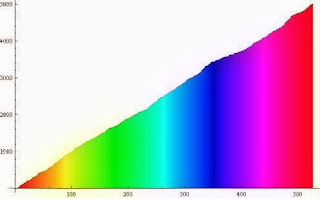A SPECIAL MATRIX:
The determinant of $latex M_{n}$, a square matrix with elements $latex m_{i,j}= \max(i,j)$, where $latex \max$ is the maximum function, is given by sequence:
A181983
This identity looks as follows:
$latex\displaystyle det{\bigg[ max(i,j) \bigg] }_{1\leq i,j \leq n} = -n \cdot {(-1)}^{n} = A181983(n)$
Proof:
A new matrix with the same determinant can be created, subtracting row i from row i+1 starting at the 2nd row, and then this determinant can be computed easily using the
expansion by minors technique at element $latex m_{1,n}$
This can be better shown with an example:
We can transform:
$latex\displaystyle M_{10} = \left(\begin{array}{cccccccccc} 1 & 2 & 3 & 4 & 5 & 6 & 7 & 8 & 9 & 10 \\ 2 & 2 & 3 & 4 & 5 & 6 & 7 & 8 & 9 & 10 \\ 3 & 3 & 3 & 4 & 5 & 6 & 7 & 8 & 9 & 10 \\ 4 & 4 & 4 & 4 & 5 & 6 & 7 & 8 & 9 & 10 \\ 5 & 5 & 5 & 5 & 5 & 6 & 7 & 8 & 9 & 10 \\ 6 & 6 & 6 & 6 & 6 & 6 & 7 & 8 & 9 & 10 \\ 7 & 7 & 7 & 7 & 7 & 7 & 7 & 8 & 9 & 10 \\ 8 & 8 & 8 & 8 & 8 & 8 & 8 & 8 & 9 & 10 \\ 9 & 9 & 9 & 9 & 9 & 9 & 9 & 9 & 9 & 10 \\ 10 & 10 & 10 & 10 & 10 & 10 & 10 & 10 & 10 & 10 \end{array} \right)$
Into:
$latex\ M^{*}_{10} =\left(\begin{array}{cccccccccc} 1 & 2 & 3 & 4 & 5 & 6 & 7 & 8 & 9 & 10 \\ 1 & 0 & 0 & 0 & 0 & 0 & 0 & 0 & 0 & 0 \\ 1 & 1 & 0 & 0 & 0 & 0 & 0 & 0 & 0 & 0 \\ 1 & 1 & 1 & 0 & 0 & 0 & 0 & 0 & 0 & 0 \\ 1 & 1 & 1 & 1 & 0 & 0 & 0 & 0 & 0 & 0 \\ 1 & 1 & 1 & 1 & 1 & 0 & 0 & 0 & 0 & 0 \\ 1 & 1 & 1 & 1 & 1 & 1 & 0 & 0 & 0 & 0 \\ 1 & 1 & 1 & 1 & 1 & 1 & 1 & 0 & 0 & 0 \\ 1 & 1 & 1 & 1 & 1 & 1 & 1 & 1 & 0 & 0 \\ 1 & 1 & 1 & 1 & 1 & 1 & 1 & 1 & 1 & 0 \end{array} \right)$
This proof can be generalized to a very similar kind of matrices, obtaining:
$latex\displaystyle det{\bigg[ max(i,j)^k \bigg]}_{1\leq i,j \leq n} = {(-1)}^{n-1} \cdot n^{k} \cdot \prod_{s=1}^{n-1}{(s+1)^k-s^k}$
$latex\displaystyle det{\bigg[ min(i,j)^k \bigg]}_{1\leq i,j \leq n} = \prod_{s=1}^{n-1}{(s+1)^k-s^k}$
References:
[1]- N. J. A. Sloane, The On-Line Encyclopedia of Integer Sequences. A051125: Table T(n,k) = max{n,k} read by antidiagonals (n >= 1, k >= 1).
[2]- Michael Somos, Apr 04 2012, The On-Line Encyclopedia of Integer Sequences. A181983: -(-1)^n * n.
[3]- Emeric Deutsch, Jun 05 2009, The On-Line Encyclopedia of Integer Sequences. A161124: Number of inversions in all fixed-point-free involutions of {1,2,...,2n}.
[4]- N. J. A. Sloane, The On-Line Encyclopedia of Integer Sequences. A001147: Double factorial of odd numbers: (2*n-1)!! = 1*3*5*...*(2*n-1).
